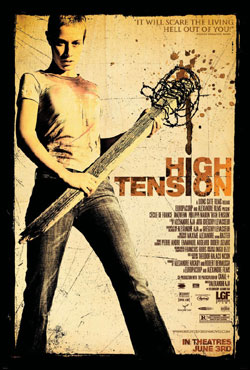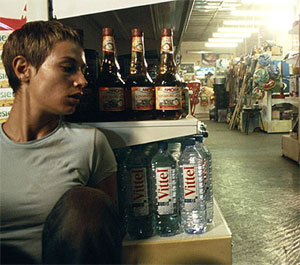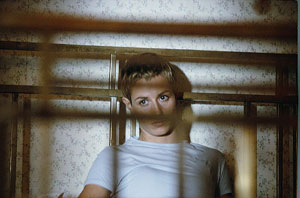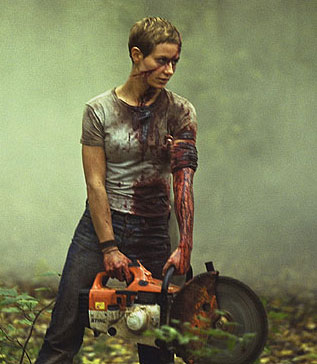 The French slasher film High Tension is a real throwback to the kind of horror movie that’s getting remade – in a softcore way – today. Director Alexandre Aja has crafted a spiritual successor to The Texas Chainsaw Massacre, an unrelenting exercise in thrills and scares.
The French slasher film High Tension is a real throwback to the kind of horror movie that’s getting remade – in a softcore way – today. Director Alexandre Aja has crafted a spiritual successor to The Texas Chainsaw Massacre, an unrelenting exercise in thrills and scares.
The star of the film is the Cesar winning actress Cecile De France. With her hair cropped short and wearing a tattered t-shirt, she spends the film’s running time in single combat with the movie’s mysterious and single-minded killer. She’s one tough lady, and while she only has a few lines in the film she gets across volumes with her actions.
De France also did her own dubbing work on the film (it’s partially subtitled and partially dubbed) and her English is pretty good, but she had a translator on hand for when things got complicated. Most of the time the translator’s assistance is just folded into the answers for ease of reading, but at one point she chimed in seperately, so don’t be alarmed when she shows up!
High Tension has an ending that you may not want spoiled. There are some elements of this interview, conducted last week here in New York City, that could spoil things for you. They’re clearly marked!
Q: Had you seen any of the 70s horror films that influenced the movie?
De France: With Alexandre, because he has a huge culture of this kind of film. Really, he knows each scene, every detail, and so he asked me to see a lot of film. And so, I discovered great films like The Hitcher, like Duel, and of course, some classics like Shining, also Rosemary’s Baby, for the crazy part. Even Alien 2. This kind of film. For me, it was cool to discover again, because it was some film that I saw when I was a teenager, and perhaps I changed the channel, so, I was enjoying to rediscover these films.
Q: Are those movies popular in France?
De France: Yes, they are, but it’s not like here. Here it’s more in the culture. In France, perhaps I don’t know… I think in England or Belgium, in the north of Europe, it’s different, but in France, it’s not really in the culture, so it’s a part of the audience who are used to this kind of film.
Q: Did you think about some of the news stories that were happening about the guys that were capturing girls and keeping them imprisoned in the basement? The case in Belgium?
De France: No, no, no, because this film is not made to say a morality or to talk about homosexuality. It’s only about thrills, that’s all…about tension, about this attraction and repulsion that we have for things that terrify us. That’s all. It’s not about psychological. It’s only for enjoying, for people who like this kind of film.
 Q: This is a very different movie for you, obviously, How did they come to you to do this, and how did you first get involved?
Q: This is a very different movie for you, obviously, How did they come to you to do this, and how did you first get involved?
De France: We shoot it three years ago, so they propose me something like four years ago now, and they just propose me like that and so, they gave me the script and I went back home, and I read it in one sitting. I devoured it and I got scared. It’s like a good book that you never want to end, because it gives you a real thrill, so I just…and also, it was the first time that a director proposed me a role that is so violent. And also, because I like this kind of film… and also, because I’m from theatre and perhaps because I’m used to working my character at first with my body. And of course, in this kind of film, you speak more with your body then with your head. That’s why I was attracted by this kind of character.
Q: So this was a lot of night shoots and it’s obviously very physical. What was the shoot like? Were you grim on set? Were you having fun on set?
De France: It was low budget film, so it was very very hard conditions. Only at night, in the cold, we were dirty and barefoot. We must be fast. It was very very tough, but because it was a cheap team. We shot in Romania, but all of the budget went into the Gionetti DeRossi budget. He’s a master of special effects, and he ‘s a real craftsman. I mean, he did the make up of Dune, of Once Upon a Time in America, of Visconti’s film and so, all of the budget went to him, because he’s great! And he did all of these scars by his hands, so I was very interested and very excited to discover this part of this kind of film. And you know, the blood, and how he did it. Yeah, it’s cool!
Q: You trained as a boxer, right?
De France: Yes, I did the physical work with an amateur Thai boxing champion, because Alexandre wanted me to build up my stamina, because he knew that the film would be hard with these conditions. And also, to lose my too healthy side and change my face, something more angular. Yeah, for me, two months of training every day every day every day every day and to learn how to pass my limits. It was very interesting.
Q: Did you insist on doing your own dubbing?
De France: Insist? No, they propose me so I was very proud, so that’s better if it’s me and I like to play in English, because it’s more dynamic.
Q: The film is partially dubbed – there are some scenes that have subtitles. How was that decision made?
De France: They decided to tell Marie [her character] goes to Alex’s family to learn English, so all of the Alex family members speak in English, and when I speak to the police, to the gas station man, it’s in French. That’s it, no? I haven’t seen the English version yet. Not yet.
Translator: I’ll explain cause I saw it. Basically, they changed the story to make the dubbing work, so that Marie is going to her American friend’s house in the south of France so she can practice her English, but she’s French, so anything that happens outside that family unit, happens in French, so that’s why it goes back and forth that she speaks to her friend Alex in English—Alex is American—but the other part, she speaks to everybody else in French, and it kind of shows the duality of Marie’s character without giving anything away.
Q: Do you think that Alexandre had an advantage, being so young when directing this  film?
film?
De France: No, just loved do that… ah, or perhaps because he’s a part of this kind of generation and I think who are more interested in horror movie. Because he knows very well each scenes, each dialogues, and this film and this moment, that’s happened that that that, so he has a huge culture of that kind of film.
Q: There have been a lot of French films that incorporate a lot more violence like Irreversible. Have you seen those films and do you think this film is sort of in the same vein as some of those films?
De France: No, no….we knew that it’s a film more like the ‘70s film. That’s why the car is an old American car of the ‘70s. The gas station…it’s like an homage to this kind of film. It’s not Irreversible. It’s different.
Q: It’s funny because in America, you say that it’s a French film, everybody assumes it’s going to be a very arty high-falutin’ movie..do you think that’s an unfair look at French films? Do you think if more Americans saw more French films, they’d get a better understanding?
De France: Yes, of course. It’s a different culture. That’s why it’s interesting to see an Indian film. Of course, it’s a different way to tell a story. It’s only art, so it’s more interesting to see how they do it in other countries and cultures.
Q: Do you normally have short hair?
De France: I change my hair for each film. Since High Tension, I’ve changed five times, brown, red, blonde, long, short. For each character, I change my hair.
Q: So since High Tension is four years ago, talk about some of the films that you’ve done since then, some of the projects you’ve been working on
De France: I don’t remember everything! A film with Etienne Chatiliez, La Confiance Regne. A film with Daniele Thompson, Fauteuils d’orchestre – with Sydney Pollack. Sydney Pollack has a small role in it. I did the sequel to L’Auberge espagnole. It’s the same cast of characters, five years later. It’s called Russian Dolls and will go out in France in a few days.
Q: Speaking of sequels, one of the great traditions of American horror films is that they get sequelized. There is always a part 2, a part 3, a part 4. Would you come back for a High Tension 2?
De France: It depends on the script. It depends on a lot of things. It depends on my character, it depends on the director – but this film is a major… because it was a low budget film, because Alexandre was very young, because I was not famous, because of a lot of elements. It’s like when you do cooking and gasp! Something happens. If we do a sequel with more money, I would like that.
Q: Having played a couple of lesbian roles are you worried that you will be typecast, that the public will see you that way?
De France: In America I hope not. In France I am a very lucky actress, all of the journalists always say that I am used to play so different characters. I don’t know what happens here, I am not calculating something. I am so happy and so proud that High Tension will go out here. That’s all. I don’t think about what’s happening in the future.
 [The next part will next question is spoilery, so it’s hidden in inviso-text. Swipe to read!]
[The next part will next question is spoilery, so it’s hidden in inviso-text. Swipe to read!]
Q: Many people have problems with the big twist. Without giving it away, how do you feel about the twist at the end of the movie?
De France: I had so much to do with my character that I couldn’t think about all the keys and stuff. I had confidence in Alexandre and let him do what he had to do. For me it was more interesting to play this twist because that means my character is very crazy. For me it’s very interesting to play the schizophrenia and to play the dark part of my character. I like to do that.
Q: This role had a lot of physical challenges. Do you find that this is as hard as comedy? Some people say it’s much harder to do comedy.
De France: For this film for example I was a bit nervous about acting the real fear, the confrontation with evil because it’s a feeling I had never experienced. Of course I wanted it to be more close of the reality as much as possible. I wanted the people to identify with me. It was very important to play the fear in a strong way. In a real way. Mentally it was hard to concentrate on this.
But like Around the World in 80 Days is comedic and that’s hard too because it’s about rhythm.
Q: In Spanish Apartment the comedy there was very ironic. Was it similar in Russian Dolls?
De France: Yes! In Russian Dolls you will see a very difficult scene because I had to play my character playing a very posh girl, I have to pretend to be the fiancée of my friend Xavier. We have been showing it in France and audiences laugh very much.
Q: How was it going back to that role, which was such a break out for you?
De France: It was three years in shooting, but in the story it’s five years. I just watched L’Auberge espagnol again and of course Cedric Klapisch is a huge director to direct actors. We did a lot of improvisation. We did a lot of work together. It was a preparation, yeah.
Q: Has Alexandre approached you about The Hills Have Eyes?
De France: No.
Q: Well, that’s a shame. So you said that you watched many American horror movies for this film – what was your favorite?
De France: The Hitcher. Because I knew that they had no money. And when you have no money you have to be very clever. You have to work your mind a lot to think, how can I scare the audience with nothing? With no explosions, with no digital effects. It’s only about tension. What can I do with a little image and a little acting?